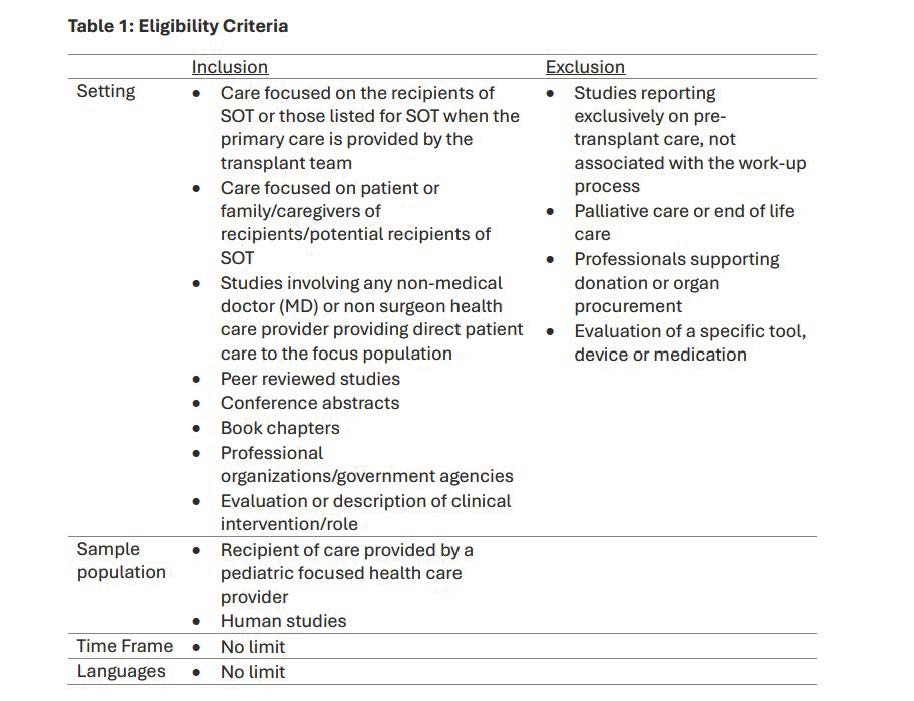
Allied health and nursing multidisciplinary team composition in pediatric solid organ transplant: A scoping review protocol
Jenny Wichart1, Catherine Patterson2,3,4, Jo Wray5, Louise Bannister2, Beverly Kosmach-Park6, Janice Y Kung7, Gillian Mayersohn8, Caroline Piotrowski9, Jenny Prufe10,11, Anna Gold2,12.
1Department of Pharmacy, Alberta Children's Hospital, Calgary, AB, Canada; 2Transplant and Regenerative Medicine Centre, The Hospital for Sick Children, Toronto, ON, Canada; 3Department of Rehabilitation Medicine, The Hospital for Sick Children, Toronto, ON, Canada; 4Department of Physical Therapy, Faculty of Medicine, University of Toronto, Toronto, ON, Canada; 5Heart and Lung Directorate, Great Ormond Street Hospital for Children NHS Foundation Trust, London, United Kingdom; 6Department of Transplant Surgery, UPMC Children's Hospital of Pittsburgh, Pittsburgh, PA, United States; 7Geoffrey & Robyn Sperber Health Sciences Library, University of Alberta, Edmonton, AB, Canada; 8Division of Pediatric Psychology, Cardinal Glennon Children's Hospital, St. Louis, MO, United States; 9Department of Community Health Sciences, Max Rady College of Medicine, Rady Faculty of Health Sciences, University of Manitoba, Winnipeg, MB, Canada; 10Paediatrics II, University Hospital Essen, Essen, Germany; 11Center for Health and Society, University Hospital Düsseldorf, Düsseldorf, Germany; 12Department of Psychology, The Hospital for Sick Children, Toronto, ON, Canada
Introduction: Research highlights various physical, medical and psychosocial comorbidities linked to transplantation in children. To deliver comprehensive holistic care for both children and their families, a multidisciplinary team, including allied health and nursing professionals (AHNP), is essential to meet the wide array of transplant needs. Before embarking on a scoping review to explore roles and effectiveness of interventions delivered by AHNP in transplant multidisciplinary teams, a carefully defined protocol was developed requiring an iterative process, described below.
Methods: The scoping review protocol is guided by the Arksey and O’Malley and Joanna Briggs Institute (JBI) frameworks. In collaboration with a research librarian, a systematic search strategy was designed and will be conducted in MEDLINE, Embase, CINAHL, Scopus and Web of Science Core Collection. Given the heterogeneity of the published data, an iterative process was undertaken to refine the research question and eligibility criteria. The study protocol was pre-registered on the Open Science Framework database (https://osf.io/jecvz/).
Results: Before initiating screening and data extraction, a review of the eligibility criteria was conducted. In phase 1, an initial sample of abstracts (n=100) was piloted and discussed until a sufficient level of agreement (κ > 0.8) was observed between 3 screeners. To increase level of agreement, criteria were refined for phase 2 review. In phase 2, eligible studies included those describing or evaluating AHNP clinical interventions (excluding studies describing allied health involvement in evaluation of devices, tools or medication) and individual AHNP roles within a transplant team, specifically any health care provider who is not a medical/surgical doctor providing transplant or transplant listing direct patient care. This was intended to account for the differing nomenclature used for AHNP globally. To assess reliability of the refined eligibility criteria (see Table 1) a new search was completed with a further sample of 100 abstracts piloted to ensure agreement between the 3 screeners.
Conclusion: The overall scoping review will focus on the roles and clinical interventions of AHNP in caring for pediatric solid organ transplant recipients, and their effectiveness. Creation of the protocol for this scoping review highlights the specificity needed to elucidate this from existing literature, in order to elicit the vast array of AHNP related activities that support transplant patients and their families. Our aim is that findings from this scoping review will more clearly define the current landscape of ANHP in multidisciplinary transplant teams and allow for development of a framework for implementing and supporting the ideal team composition in pediatric solid organ transplant.

[1] allied health
[2] nursing
[3] multidisciplinary team
[4] pediatric
[5] solid organ transplant
[6] scoping review